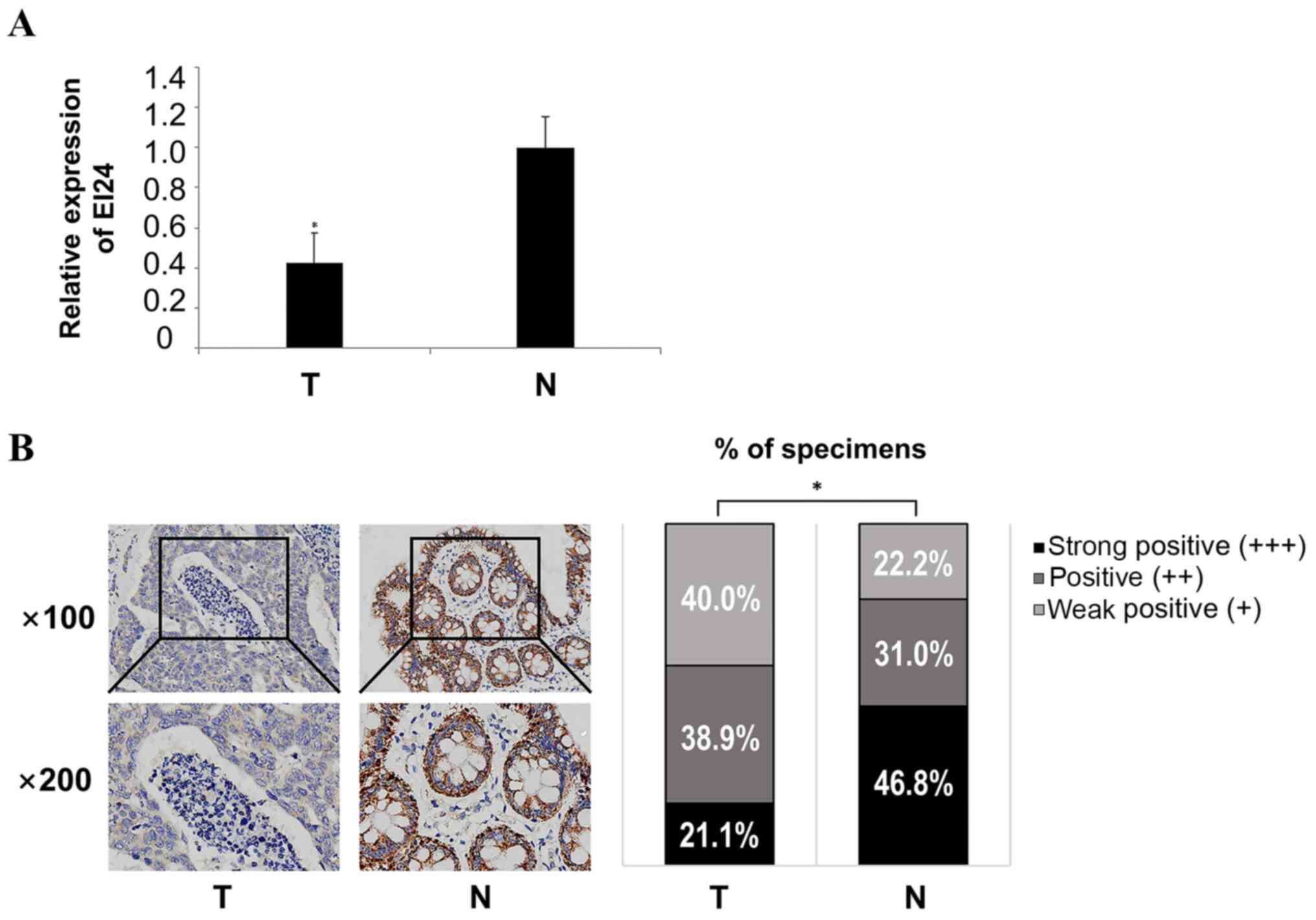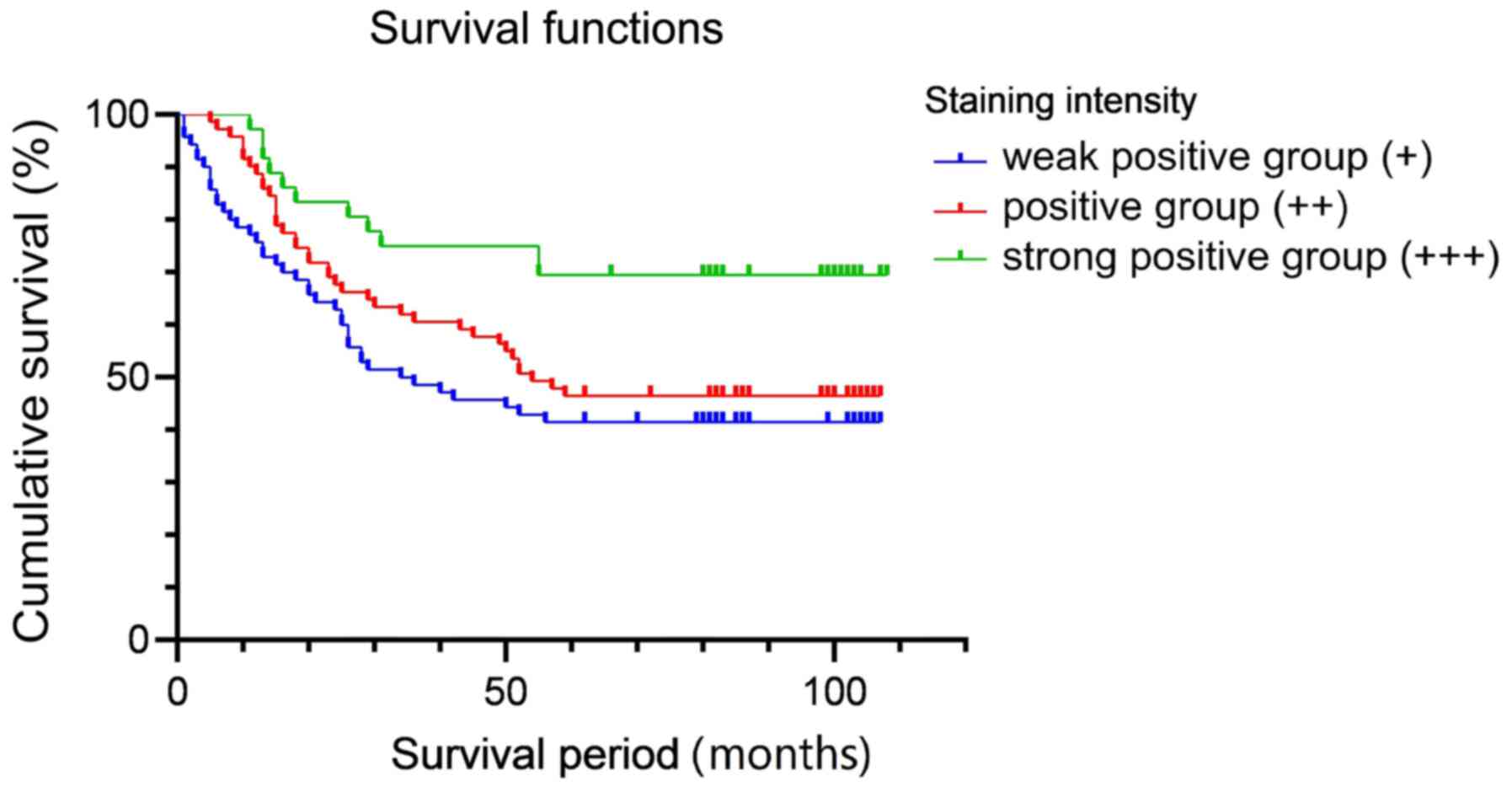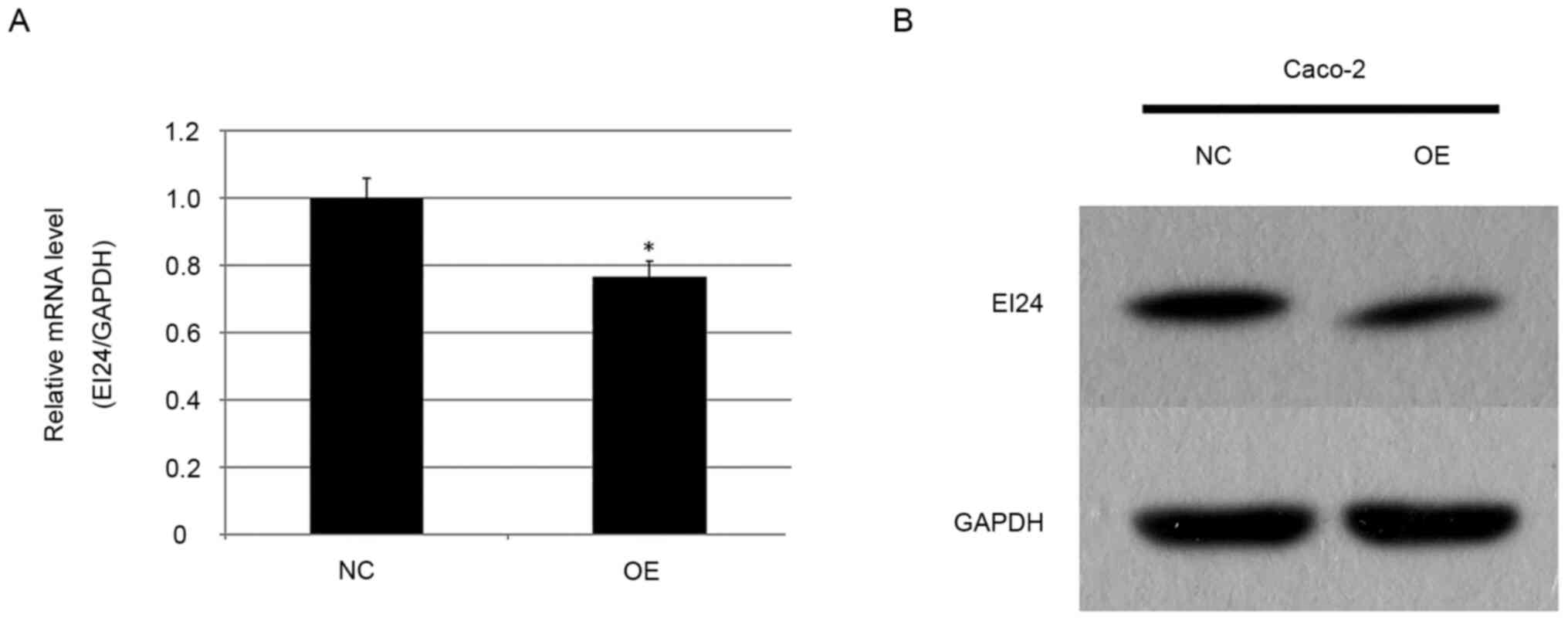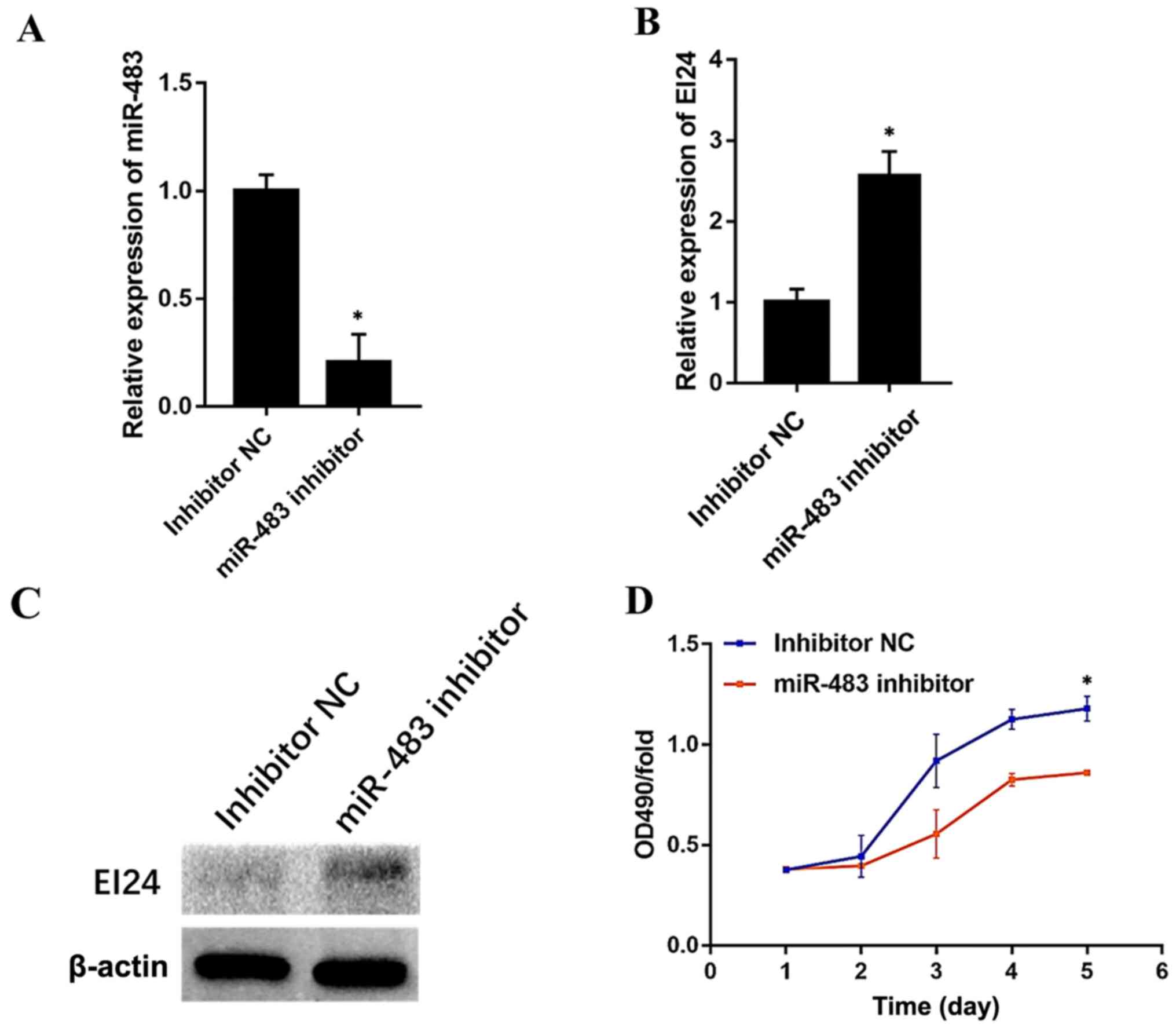|
1
|
Dekker E, Tanis PJ, Vleugels JLA, Kasi PM
and Wallace MB: Colorectal cancer. Lancet. 394:1467–1480. 2019.
View Article : Google Scholar : PubMed/NCBI
|
|
2
|
Yang Q, Hou C, Huang D, Zhuang C, Jiang W,
Geng Z, Wang X and Hu L: miR-455-5p functions as a potential
oncogene by targeting galectin-9 in colon cancer. Oncol Lett.
13:1958–1964. 2017. View Article : Google Scholar : PubMed/NCBI
|
|
3
|
Brenner H, Kloor M and Pox CP: Colorectal
cancer. Lancet. 383:1490–1502. 2014. View Article : Google Scholar : PubMed/NCBI
|
|
4
|
Zhou W, Zhou X, Liu JQ, Zhang YJ and Hong
L: High expression of miR-21 in tissue correlated with the poor
survival of patients with esophageal cancer: A pilot study using
the meta-analysis. J Prev Med Care. 1:9–15. 2016. View Article : Google Scholar
|
|
5
|
Chen X, Zhang DH and You ZH: A
heterogeneous label propagation approach to explore the potential
associations between miRNA and disease. J Transl Med. 16:3482018.
View Article : Google Scholar : PubMed/NCBI
|
|
6
|
Ma J, Hong L, Chen Z, Nie Y and Fan D:
Epigenetic regulation of microRNAs in gastric cancer. Dig Dis Sci.
59:716–723. 2014. View Article : Google Scholar : PubMed/NCBI
|
|
7
|
Chi SW, Zang JB, Mele A and Darnell RB:
Argonaute HITS-CLIP decodes microRNA-mRNA interaction maps. Nature.
460:479–486. 2009. View Article : Google Scholar : PubMed/NCBI
|
|
8
|
Zhou W, Yang W, Ma J, Zhang H, Li Z, Zhang
L, Liu J, Han Z, Wang H and Hong L: Role of miR-483 in digestive
tract cancers: From basic research to clinical value. J Cancer.
9:407–414. 2018. View Article : Google Scholar : PubMed/NCBI
|
|
9
|
Ferland-McCollough D, Fernandez-Twinn DS,
Cannell IG, David H, Warner M, Vaag AA, Bork-Jensen J, Brøns C,
Gant TW, Willis AE, et al: Programming of adipose tissue miR-483-3p
and GDF-3 expression by maternal diet in type 2 diabetes. Cell
Death Differ. 19:1003–1012. 2012. View Article : Google Scholar : PubMed/NCBI
|
|
10
|
Wang H, Zhang H, Sun Q, Wang Y, Yang J,
Yang J, Zhang T, Luo S, Wang L, Jiang Y, et al: Intra-articular
delivery of Antago-miR-483-5p inhibits osteoarthritis by modulating
matrilin 3 and tissue inhibitor of metalloproteinase 2. Mol Ther.
25:715–727. 2017. View Article : Google Scholar : PubMed/NCBI
|
|
11
|
Qiao Y, Ma N, Wang X, Hui Y, Li F, Xiang
Y, Zhou J, Zou C, Jin J, Lv G, et al: miR-483-5p controls
angiogenesis in vitro and targets serum response factor. FEBS Lett.
585:3095–3100. 2011. View Article : Google Scholar : PubMed/NCBI
|
|
12
|
Shi L, Liu S, Zhao WQ and Shi JZ:
miR-483-5p and miR-486-5p are down-regulated in cumulus cells of
metaphase II oocytes from women with polycystic ovary syndrome.
Reprod Biomed Online. 31:565–572. 2015. View Article : Google Scholar : PubMed/NCBI
|
|
13
|
Yu X, Li Z, Chan MT and Wu WK: The roles
of microRNAs in Wilms' tumors. Tumour Biol. 37:1445–1450. 2016.
View Article : Google Scholar : PubMed/NCBI
|
|
14
|
Song Q, Xu Y, Yang C, Chen Z, Jia C, Chen
J, Zhang Y, Lai P, Fan X, Zhou X, et al: miR-483-5p promotes
invasion and metastasis of lung adenocarcinoma by targeting RhoGDI1
and ALCAM. Cancer Res. 74:3031–3042. 2014. View Article : Google Scholar : PubMed/NCBI
|
|
15
|
Patterson EE, Holloway AK, Weng J, Fojo T
and Kebebew E: MicroRNA profiling of adrenocortical tumors reveals
miR-483 as a marker of malignancy. Cancer. 117:1630–1639. 2011.
View Article : Google Scholar : PubMed/NCBI
|
|
16
|
Si Y, Zhang H, Ning T, Bai M, Wang Y, Yang
H, Wang X, Li J, Ying G and Ba Y: miR-26a/b inhibit tumor growth
and angiogenesis by targeting the HGF-VEGF axis in gastric
carcinoma. Cell Physiol Biochem. 42:1670–1683. 2017. View Article : Google Scholar : PubMed/NCBI
|
|
17
|
Xue L, Nan J, Dong L, Zhang C, Li H, Na R,
He H and Wang Y: Upregulated miR-483-5p expression as a prognostic
biomarker for esophageal squamous cell carcinoma. Cancer Biomark.
19:193–197. 2017. View Article : Google Scholar : PubMed/NCBI
|
|
18
|
Zang Y, Zhu L, Li T, Wang Q, Li J, Qian Y,
Wei L, Xie M, Tang WH, Liu X, et al: EI24 suppresses tumorigenesis
in pancreatic cancer via regulating c-Myc. Gastroenterol Res Pract.
2018:26265452018. View Article : Google Scholar : PubMed/NCBI
|
|
19
|
Li Z, Meng Q, Pan A, Wu X and Li L:
MicroRNA-455-3p promotes invasion and migration in triple negative
breast cancer by targeting tumor suppressor EI24. Oncotarget.
8:19455–19466. 2017. View Article : Google Scholar : PubMed/NCBI
|
|
20
|
Choi JM, Jang JY, Choi YR, Kim HR, Cho BC
and Lee HW: Reduced expression of EI24 confers resistance to
gefitinib through IGF-1R signaling in PC9 NSCLC cells. Lung Cancer.
90:175–181. 2015. View Article : Google Scholar : PubMed/NCBI
|
|
21
|
Nam TW, Park SY, Lee JH, Roh JI and Lee
HW: Effect of EI24 expression on the tumorigenesis of
ApcMin/+ colorectal cancer mouse model. Biochem Biophys
Res Commun. 514:1087–1092. 2019. View Article : Google Scholar : PubMed/NCBI
|
|
22
|
Choi JM, Devkota S, Sung YH and Lee HW:
EI24 regulates epithelial-to-mesenchymal transition and tumor
progression by suppressing TRAF2-mediated NF-κB activity.
Oncotarget. 4:2383–2396. 2013. View Article : Google Scholar : PubMed/NCBI
|
|
23
|
Mazumder Indra D, Mitra S, Singh RK, Dutta
S, Roy A, Mondal RK, Basu PS, Roychoudhury S and Panda CK:
Inactivation of CHEK1 and EI24 is associated with the development
of invasive cervical carcinoma: Clinical and prognostic
implications. Int J Cancer. 129:1859–1871. 2011. View Article : Google Scholar : PubMed/NCBI
|
|
24
|
Ma J, Hong L, Xu G, Hao J, Wang R, Guo H,
Liu J, Zhang Y, Nie Y and Fan D: miR-483-3p plays an oncogenic role
in esophageal squamous cell carcinoma by targeting tumor suppressor
EI24. Cell Biol Int. 40:448–455. 2016. View Article : Google Scholar : PubMed/NCBI
|
|
25
|
Mentz RJ, Hernandez AF, Berdan LG, Rorick
T, O'Brien EC, Ibarra JC, Curtis LH and Peterson ED: Good clinical
practice guidance and pragmatic clinical trials: Balancing the best
of both worlds. Circulation. 133:872–880. 2016. View Article : Google Scholar : PubMed/NCBI
|
|
26
|
Livak KJ and Schmittgen TD: Analysis of
relative gene expression data using real-time quantitative PCR and
the 2(-Delta Delta C(T) method. Methods. 25:402–408. 2001.
View Article : Google Scholar : PubMed/NCBI
|
|
27
|
MacArthur Clark JA and Sun D: Guidelines
for the ethical review of laboratory animal welfare People's
Republic of China National Standard GB/T 3589218 [Issued 6 February
2018 Effective from 1 September 2018]. Animal Model Exp Med.
3:103–113. 2020. View Article : Google Scholar : PubMed/NCBI
|
|
28
|
Duan L, Ma J, Yang W, Cao L, Wang X, Niu
L, Li Y, Zhou W, Zhang Y, Liu J, et al: EI24 inhibits cell
proliferation and drug resistance of esophageal squamous cell
carcinoma. Front Oncol. 10:15702020. View Article : Google Scholar : PubMed/NCBI
|
|
29
|
Malki A, ElRuz RA, Gupta I, Allouch A,
Vranic S and Al Moustafa AE: Molecular mechanisms of colon cancer
progression and metastasis: Recent insights and advancements. Int J
Mol Sci. 22:1302020. View Article : Google Scholar : PubMed/NCBI
|
|
30
|
Leber MF and Efferth T: Molecular
principles of cancer invasion and metastasis (review). Int J Oncol.
34:881–895. 2009.PubMed/NCBI
|
|
31
|
Vu T and Datta PK: Regulation of EMT in
colorectal cancer: A culprit in metastasis. Cancers (Basel).
9:1712017. View Article : Google Scholar : PubMed/NCBI
|
|
32
|
Haase G, Gavert N, Brabletz T and
Ben-Ze'ev A: The Wnt target gene L1 in colon cancer invasion and
metastasis. Cancers (Basel). 8:482016. View Article : Google Scholar : PubMed/NCBI
|
|
33
|
Weidle UH, Birzele F and Krüger A:
Molecular targets and pathways involved in liver metastasis of
colorectal cancer. Clin Exp Metastasis. 32:623–635. 2015.
View Article : Google Scholar : PubMed/NCBI
|
|
34
|
Liu X, Ji Q, Fan Z and Li Q: Cellular
signaling pathways implicated in metastasis of colorectal cancer
and the associated targeted agents. Future Oncol. 11:2911–2922.
2015. View Article : Google Scholar : PubMed/NCBI
|
|
35
|
Huang D, Sun W, Zhou Y, Li P, Chen F, Chen
H, Xia D, Xu E, Lai M, Wu Y and Zhang H: Mutations of key driver
genes in colorectal cancer progression and metastasis. Cancer
Metastasis Rev. 37:173–187. 2018. View Article : Google Scholar : PubMed/NCBI
|
|
36
|
Huang S, Tan X, Huang Z, Chen Z, Lin P and
Fu SW: MicroRNA biomarkers in colorectal cancer liver metastasis. J
Cancer. 9:3867–3873. 2018. View Article : Google Scholar : PubMed/NCBI
|
|
37
|
Niu L, Yang W, Duan L, Wang X, Li Y, Xu C,
Liu C, Zhang Y, Zhou W, Liu J, et al: Biological implications and
clinical potential of metastasis-related miRNA in colorectal
cancer. Mol Ther Nucleic Acids. 23:42–54. 2020. View Article : Google Scholar : PubMed/NCBI
|
|
38
|
Allgayer H, Leupold JH and Patil N:
Defining the ‘Metastasome’: Perspectives from the genome and
molecular landscape in colorectal cancer for metastasis evolution
and clinical consequences. Semin Cancer Biol. 60:1–13. 2020.
View Article : Google Scholar : PubMed/NCBI
|
|
39
|
Zhou Y and Hong L: Prediction value of
miR-483 and miR-214 in prognosis and multidrug resistance of
esophageal squamous cell carcinoma. Genet Test Mol Biomarkers.
17:470–474. 2013. View Article : Google Scholar : PubMed/NCBI
|
|
40
|
Wang C, Wang X, Su Z, Fei H, Liu X and Pan
Q: miR-25 promotes hepatocellular carcinoma cell growth, migration
and invasion by inhibiting RhoGDI1. Oncotarget. 6:36231–36244.
2015. View Article : Google Scholar : PubMed/NCBI
|
|
41
|
Xiao Y, Guo Q, Jiang TJ, Yuan Y, Yang L,
Wang GW and Xiao WF: miR-483-3p regulates osteogenic
differentiation of bone marrow mesenchymal stem cells by targeting
STAT1. Mol Med Rep. 20:4558–4566. 2019.PubMed/NCBI
|
|
42
|
Cui H, Liu Y, Jiang J, Liu Y, Yang Z, Wu
S, Cao W, Cui IH and Yu C: IGF2-derived miR-483 mediated
oncofunction by suppressing DLC-1 and associated with colorectal
cancer. Oncotarget. 7:48456–48466. 2016. View Article : Google Scholar : PubMed/NCBI
|
|
43
|
Løes IM, Immervoll H, Sorbye H, Angelsen
JH, Horn A, Knappskog S and Lønning PE: Impact of KRAS, BRAF,
PIK3CA, TP53 status and intraindividual mutation heterogeneity on
outcome after liver resection for colorectal cancer metastases. Int
J Cancer. 139:647–656. 2016. View Article : Google Scholar
|
|
44
|
Kawaguchi Y, Kopetz S, Newhook TE, De
Bellis M, Chun YS, Tzeng CD, Aloia TA and Vauthey JN: Mutation
status of RAS, TP53, and SMAD4 is superior to mutation status of
RAS alone for predicting prognosis after resection of colorectal
liver metastases. Clin Cancer Res. 25:5843–5851. 2019. View Article : Google Scholar : PubMed/NCBI
|




















